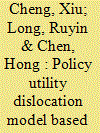|
|
|
Sort Order |
|
|
|
Items / Page
|
|
|
|
|
|
|
| Srl | Item |
| 1 |
ID:
171405


|
|
|
|
|
| Summary/Abstract |
A low-carbon lifestyle is an inevitable choice for mitigating climate change. However, in the actual situation where policy makers and policy target groups are separated from each other, low-carbon lifestyle changes are often manifested as individual strong government actions, behind which social actions are seriously lagging. Based on this observation, in this study a concept of policy utility dislocation was developed, and a policy utility dislocation model was constructed based on prospect theory. Numerical simulation showed that policy utility dislocation can be reduced by increasing the proportion of residents’ environmental benefits, government efforts and subsidies, and reducing the cost of implementing a low-carbon lifestyle for residents. In particular, when the environmental benefits of the government and residents accounted for 15% and 65%, respectively, or the subsidy coefficient was 2, the policy utility dislocation became zero. In addition, policy utility dislocation began to appear when the cost of implementing a low carbon lifestyle exceeded 3. This study enriches the connotation of policy utility and quantifies the policy utility dislocation, and provides new ways to launch policies that promote low-carbon lifestyles.
|
|
|
|
|
|
|
|
|
|
|
|
|
|
|
|
| 2 |
ID:
180100


|
|
|
|
|
| Summary/Abstract |
Learning capacity and social interaction have increasingly become, respectively, the internal core of, and source of external support for, policy response. In this study, the impact of learning capacity and social interaction on the experienced utility of low-carbon lifestyle guiding policies was examined with a sample of 3257 urban residents in eastern China. Ordinary least squares and instrumental variable method were used to test the hypothesis and robustness. It was found that learning capacity positively promoted the experienced utility of the low-carbon lifestyle guiding policies. Social interaction, as measured by structural characteristics, functional characteristics, information characteristics, and relationship characteristics, has an inverted-U-shaped moderating effect on the relationship between learning capacity and policy experienced utility. Furthermore, different from the inverted-U-shaped moderating effect of structural, information, and relationship characteristics, functional characteristics positively moderated the relationship between learning capacity and policy experienced utility. We therefore reveal the effect of learning capacity and social interaction on experienced utility of low-carbon lifestyle guiding policies, and provide useful guidance for policy-makers on how to make better use of learning and social interaction to enhance policy experienced utility and promote low-carbon lifestyles.
|
|
|
|
|
|
|
|
|
|
|
|
|
|
|
|
|
|
|
|
|